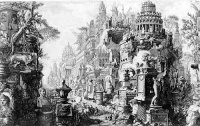Romulus and Remus
From The Art and Popular Culture Encyclopedia
| Revision as of 10:48, 21 November 2009 Jahsonic (Talk | contribs) ← Previous diff |
Revision as of 11:13, 21 November 2009 Jahsonic (Talk | contribs) Next diff → |
||
| Line 4: | Line 4: | ||
| {{Template}} | {{Template}} | ||
| :''[[founding myth]], [[legend]], [[History of Rome]], [[Ancient Rome]]'' | :''[[founding myth]], [[legend]], [[History of Rome]], [[Ancient Rome]]'' | ||
| - | |||
| '''Romulus''' and '''Remus''' (traditionally c. 771 BC–''c.'' 717 BC and c. 771 BC–c. 753 BC respectively) are the traditional [[Founding Fathers|founders]] of [[Rome]], appearing in [[Roman mythology]] as the twin sons of the [[Vestal Virgin]] [[Rhea Silvia]], fathered by the god of war, [[Mars (mythology)|Mars]]. According to the [[tradition]] recorded as history by [[Plutarch]] and [[Livy]], Romulus served as the first [[Roman Kingdom|King of Rome]]. | '''Romulus''' and '''Remus''' (traditionally c. 771 BC–''c.'' 717 BC and c. 771 BC–c. 753 BC respectively) are the traditional [[Founding Fathers|founders]] of [[Rome]], appearing in [[Roman mythology]] as the twin sons of the [[Vestal Virgin]] [[Rhea Silvia]], fathered by the god of war, [[Mars (mythology)|Mars]]. According to the [[tradition]] recorded as history by [[Plutarch]] and [[Livy]], Romulus served as the first [[Roman Kingdom|King of Rome]]. | ||
Revision as of 11:13, 21 November 2009

Illustration: Antichita Romanae (1748) by Piranesi
|
Related e |
|
Featured: |
Romulus and Remus (traditionally c. 771 BC–c. 717 BC and c. 771 BC–c. 753 BC respectively) are the traditional founders of Rome, appearing in Roman mythology as the twin sons of the Vestal Virgin Rhea Silvia, fathered by the god of war, Mars. According to the tradition recorded as history by Plutarch and Livy, Romulus served as the first King of Rome.
Romulus slew Remus with a shovel over a dispute about which one of the two brothers had the support of the local deities to rule the new city and give it his name. The name they gave the city was Rome. Supposedly, Romulus had stood on one hill and Remus another, and a circle of birds flew over Romulus, signifying that he should be king. After founding Rome, Romulus not only created the Roman Legions and the Roman Senate, but also added citizens to his new city by abducting the women of the neighboring Sabine tribes, which resulted in the mixture of the Sabines and Romans into one people. Romulus would become one of ancient Rome's greatest conquerors, adding large amounts of territory and people to the dominion of Rome.
After his death, Romulus was deified as the god Quirinus, the divine persona of the Roman people. As a mythological figure, his historical basis is disputed, and it is supposed that his name is a back-formation from the name Rome. Some scholars, notably Andrea Carandini, believe in the historicity of Romulus, in part because of the 1988 discovery of the Murus Romuli on the north slope of the Palatine Hill in Rome.
Romulus and Remus are pre-eminent among the famous feral children in mythology and fiction.

